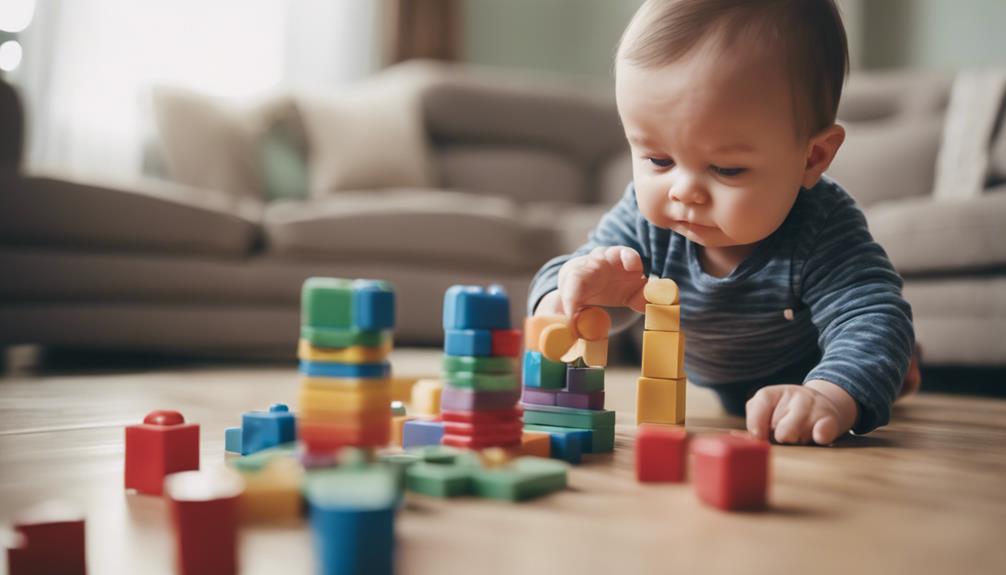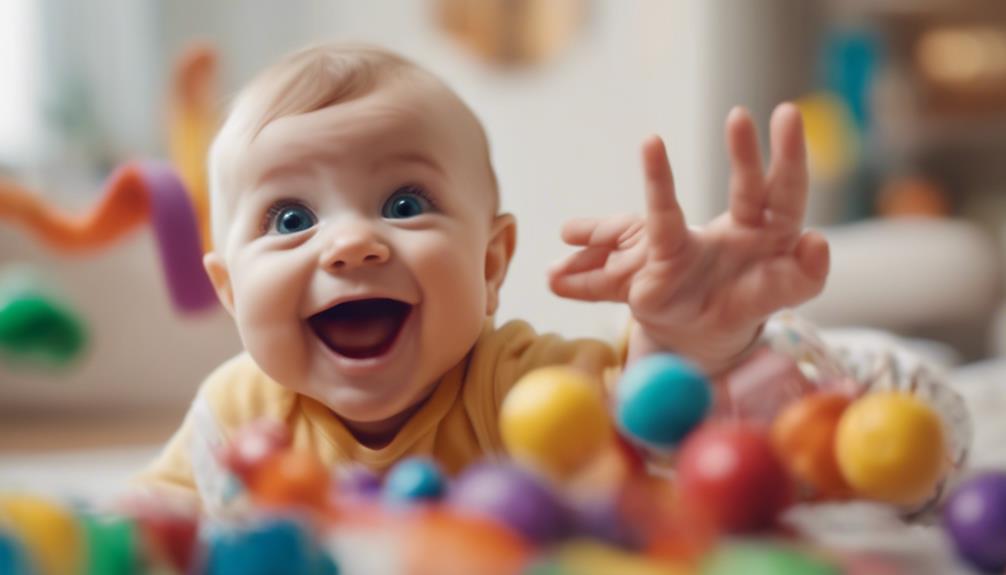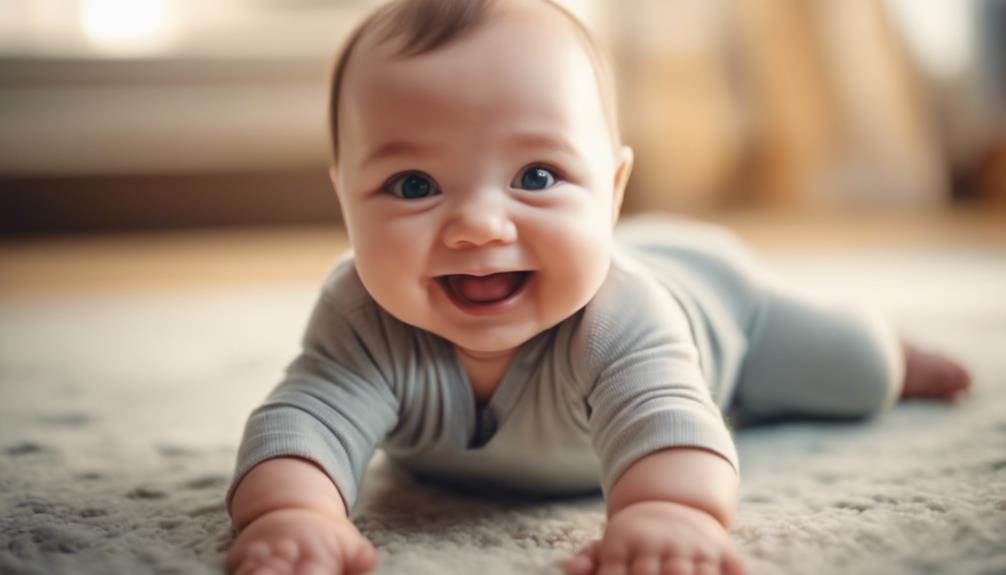To determine if your baby is advanced, observe for early achievement of milestones such as sitting up at three months or forming sentences at ten months. Quick mastery of tasks indicates higher intelligence. Curiosity and engagement, demonstrated by a thirst for knowledge and exploration, are important signs of advanced development. Surpassing expectations in areas like problem-solving skills could suggest giftedness. Tracking motor skills progress, including early attainment of milestones, may indicate advanced cognition. Assessing these markers can provide insight into your baby’s potential. More information on fostering advanced abilities is available.
Key Takeaways
- Early achievement of milestones like sitting up at 3 months suggests advanced development.
- Rapid skill acquisition in cognitive and language abilities indicates advanced intelligence.
- Curiosity, engagement, and a thirst for knowledge are signs of an advanced baby.
- Problem-solving skills, intense focus, and advanced cognitive abilities demonstrate giftedness.
- Monitoring motor skills development for early milestones can indicate advanced physical abilities.
Early Achievement of Milestones
Achieving milestones early in infancy can be an indicator of advanced development in babies. When a baby hits key milestones like sitting up unassisted at three months or forming clear sentences by the age of ten months, it may suggest advanced intelligence and cognitive abilities. Early development of skills such as sitting, crawling, and speaking can signal a higher level of cognitive functioning and communication prowess in infants.
Encouraging and supporting your baby's achievements is vital in fostering their potential. Reading to your baby and engaging in conversations can further enhance their communication skills and cognitive development. By providing a stimulating environment and recognizing their accomplishments, you can help nurture their advanced abilities.
Advanced babies often display exceptional focus, problem-solving skills, and an early curiosity that sets them apart from their peers. Recognizing and celebrating these early achievements can pave the way for continued growth and success in their developmental journey.
Rapid Skill Acquisition
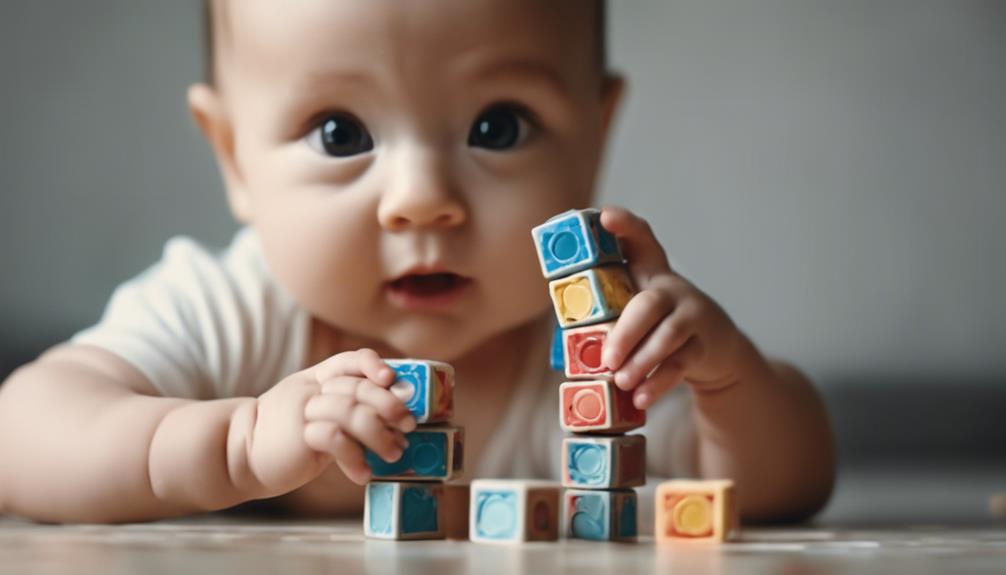
Babies who are advanced typically exhibit a rapid acquisition of skills when compared to their peers. These advanced infants demonstrate accelerated learning in various developmental areas, including cognitive and language abilities. For example, advanced babies may achieve milestones like sitting up unassisted at approximately 4.9 months, crawling upstairs by 10.5 months, and walking upstairs by 12.6 months.
Furthermore, their fine motor skills, such as holding crayons adaptively at 7.7 months, and gross motor skills, like skipping with alternating feet at 33.6 months, also show advanced development.
Early signs of giftedness in babies often manifest through their quick mastery of tasks and milestones. Advanced babies may start forming 3-word sentences as early as 16.8 months, showcasing accelerated language abilities.
Parents observing such rapid skill acquisition in their infants should seek advice to support their child's advanced learning and development. By recognizing and nurturing these early indicators, caregivers can help foster the continued growth of their advanced baby.
Curiosity and Engagement
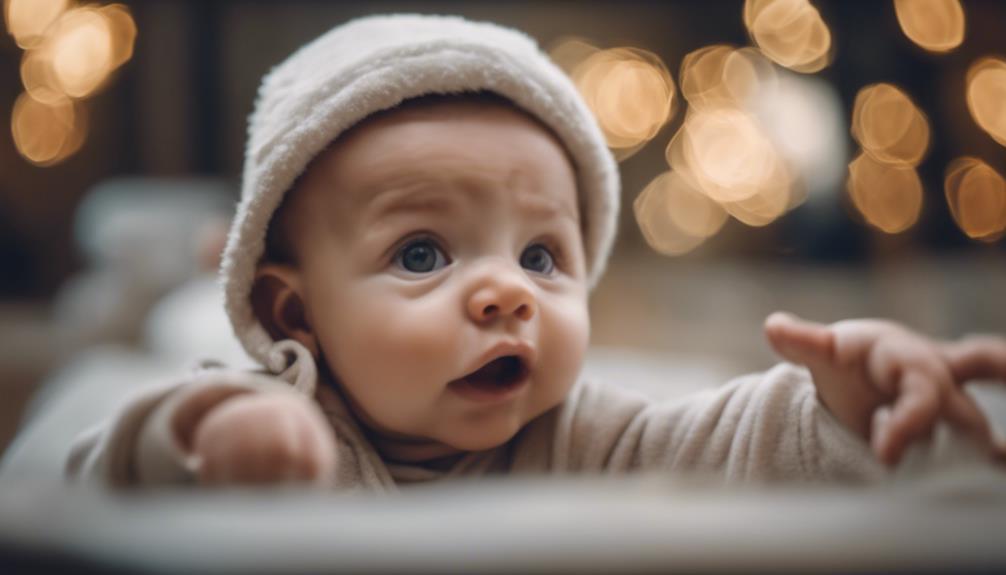
To identify if your baby is advanced, observe their intense inquisitiveness and enthusiasm to explore their surroundings. Advanced infants display a remarkable level of curiosity and engagement, which can be nurtured to further enhance their intellectual growth.
Here are some key indicators to look out for:
- Intense Curiosity: Watch for a strong desire to understand the world around them, as advanced infants often ask complex questions and show a deep interest in learning new things.
- Eagerness to Explore: Notice how actively they engage with toys, books, and activities, seeking out challenges and finding creative solutions to problems.
- Desire for Engagement: Pay attention to their interactions with their environment, as advanced babies tend to be highly engaged in their surroundings, demonstrating a thirst for knowledge and exploration.
Abilities Beyond Expectations
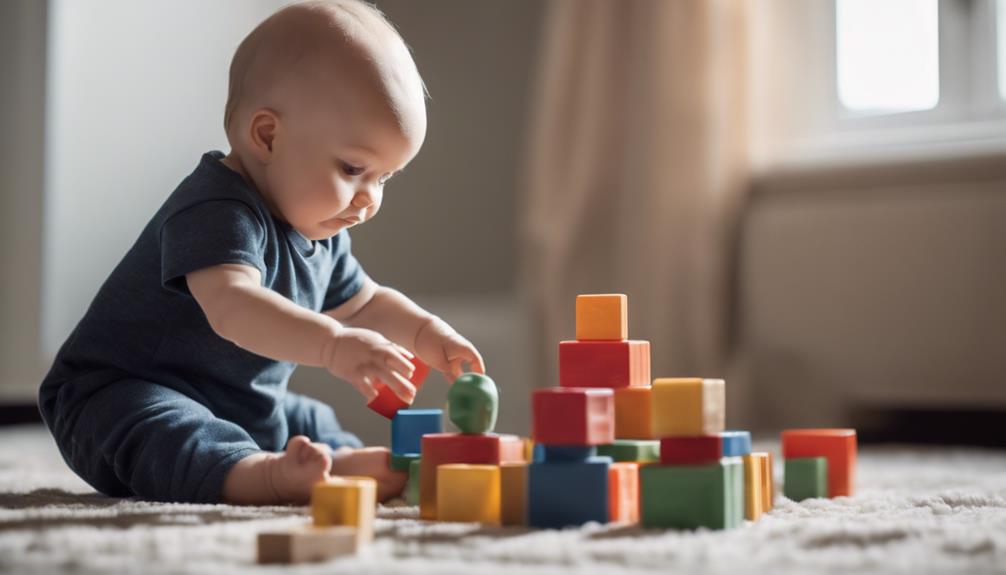
When observing your baby's development, keep an eye out for abilities that exceed typical expectations, indicating advanced intelligence. Gifted infants often display signs of highly advanced problem-solving skills at an early age. They might surprise you by creating mini-mazes or effortlessly solving challenges that are beyond what's considered normal for their age group.
Furthermore, intelligent babies may exhibit a curiosity that goes above and beyond, asking complex questions that showcase their advanced cognitive abilities. This curiosity is a key indicator of their highly advanced intelligence.
Moreover, advanced babies tend to demonstrate exceptional focus, which sets them apart from their peers. You may notice them engaging in activities with intense concentration, such as playing with blocks without getting distracted or listening attentively to an entire book at a very young age.
Additionally, some highly intelligent infants exhibit a preference for solitude over social interactions, finding joy in playing alone or interacting with older children who can match their advanced abilities.
Tracking Motor Skills
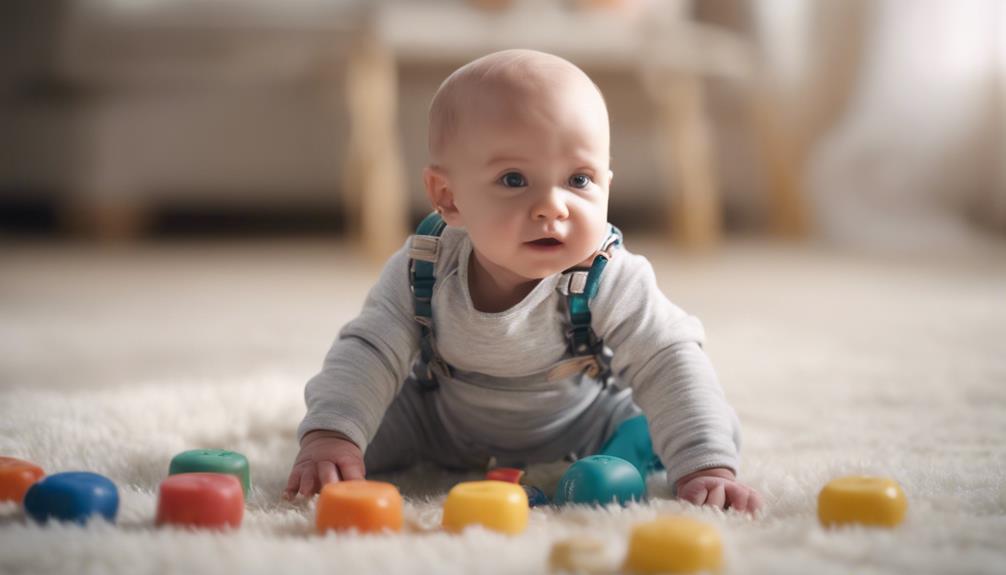
Monitoring your baby's motor skills development is essential in evaluating their physical abilities at different stages of growth. When tracking motor skills, keep an eye out for milestones achieved earlier than expected, as this can be a sign of advanced development in gifted babies.
Here are some key indicators to look for:
- Achieving gross motor skills milestones at a younger age: Observing your baby walking upstairs or skipping with alternating feet earlier than their peers could suggest highly intelligent and advanced development.
- Fine motor skills development: The ability to hold crayons adaptively at a faster rate than others can be a positive sign of advanced motor skills.
- Progression in social smiles and vocalizations: Noticing your baby engaging in social smiles and vocalizing different sounds at a younger age could indicate faster motor skills development.
Cognitive and Language Abilities
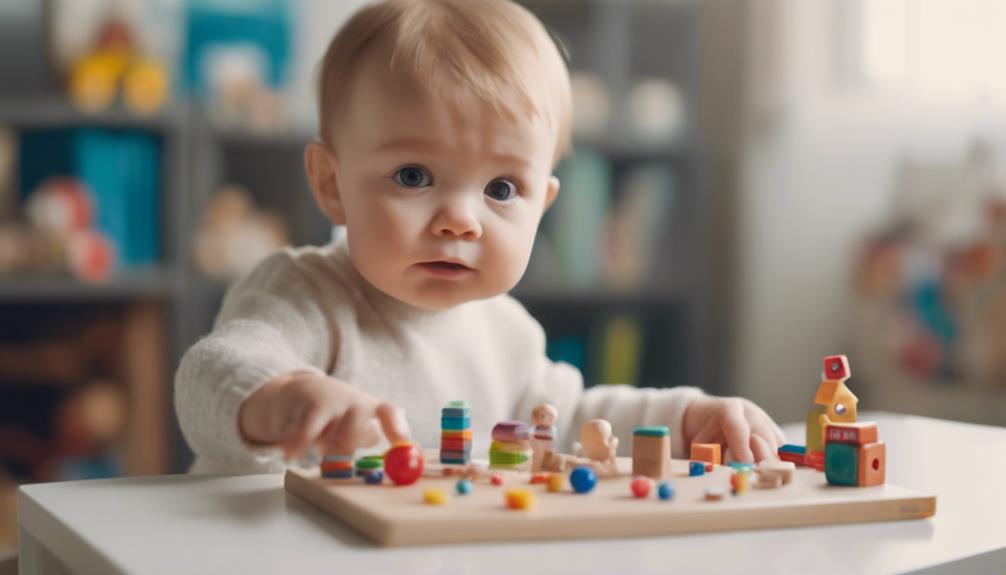
Observing your baby's early language and cognitive abilities can provide valuable insights into their development and potential giftedness. Babies demonstrating advanced cognitive and language skills often exhibit quick progression in their language development. For instance, uttering their first words like 'Dada' around 5.53 months and forming 3-word sentences by 16.8 months can be indicative of advanced cognitive capabilities. Additionally, a vocabulary of 4-6 words by 10.5 months may signal advanced language abilities in babies.
Early indicators of cognitive and language advancement in babies include vocalizing different sounds at 1.61 months and displaying a social smile at 1.05 months. Parents can observe signs of advanced cognitive abilities in their babies through their early vocalizations and engagement in communication.
Rapid progression in language skills and cognitive development compared to peers can be early signs of giftedness in babies. Keep a keen eye on these milestones to understand your baby's cognitive and language development better.
Frequently Asked Questions
How to Identify a High IQ Baby?
To identify a high IQ baby, watch for early milestones like clear sentences or sitting alone. Look for intense focus on tasks, advanced problem-solving, preference for solitude, and curiosity. These traits often signal intelligence in babies.
How Do You Identify How Advanced a Child Is in Their Development?
You can identify how advanced a child is in their development by observing early milestones, exceptional focus, problem-solving skills, preference for solitude, curiosity, birth weight, alertness, emotional intelligence, and memory retention. Trust your instincts as a parent.
How Do I Know if My 18 Month Old Is Gifted?
To know if your 18-month-old is gifted, look for a vocabulary of 50+ words, early problem-solving skills, and intense focus during play. Seek professional guidance for confirmation and support. Trust your instincts as a parent.
Is My Child Gifted or Just Smart?
You can determine if your child is gifted or just smart by observing consistent advancements in various areas, early achievement of milestones, rapid skill acquisition, high curiosity, and seeking expert advice. Comparing progress and addressing concerns can provide clarity.
Is My 7 Week Old Advanced?
At 7 weeks old, you may notice signs of advanced development in your baby. Look for increased alertness, strong visual tracking, early language skills, and advanced motor abilities. Trust your observations and enjoy watching your little one grow!
Conclusion
To sum up, identifying advanced development in your baby involves closely observing their early achievement of milestones, rapid skill acquisition, curiosity, engagement, abilities beyond expectations, motor skills, and cognitive and language abilities.
By paying attention to these key indicators, you can better understand and support your child's unique strengths and abilities.
Remember, every baby is different, and early identification of advanced development can help provide the necessary resources and opportunities for their continued growth and success.

